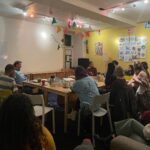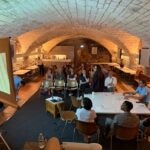

On March 21st, at the Project Room of Lumière Cinema, Refugee Project Maastricht and the Faculty of Arts and Social Sciences came together to host Stateless in the Netherlands, a lecture by Bani da Lima Ahrendt that offered personal perspectives on citizenship, belonging, and identity.
Bani da Lima shared his compelling story as a Moluccan whose family history is deeply intertwined with the complex colonial relationship between Indonesia and the Netherlands. His family arrived in the Netherlands after Indonesia’s independence, stripped of their Indonesian citizenship but denied Dutch citizenship, leaving them stateless. Born in a transit camp, Bani recounted his early years growing up in a close-knit Moluccan community where the traditional notions of ownership and individuality were replaced by a strong sense of collective identity, every adult was an “aunty” or “uncle,” and everything was shared.

Despite living his entire life in the Netherlands, Bani shared that he has never fully identified as Dutch. He reflected humorously on how people still compliment him on his “impeccable Dutch,” a language he has spoken since birth, highlighting the persistent perception of him as an outsider.
He detailed his family’s pivotal decision to leave the comfort of the Moluccan community in the transit camp in pursuit of better educational opportunities for him and his siblings. Moving out into broader Dutch society exposed Bani to a different reality. He spoke candidly about his first encounter with discrimination at age 17 when he attempted to rent an apartment in Amsterdam, facing racism and exclusion for the first time.

Throughout the lecture, Bani emphasized the journey of reclaiming his sense of freedom and self-definition. Rather than identifying as Dutch or Indonesian, he proudly embraces his Moluccan heritage, recognizing the deep transgenerational trauma and resilience passed down through his family’s experiences. One of the most striking moments of the evening was when Bani discussed his decision to remain stateless. Although he had the opportunity to acquire Dutch citizenship, he chose instead to continue living without nationality as an act of protest, a conscious decision to honor his family’s history and sacrifices. Carrying only a travel document instead of a passport with full citizenship rights, Bani described this choice as a powerful act of empowerment, deepening his connection to his parents and grandparents.

In closing, Bani left the audience with a powerful message: tolerance is not the same as acceptance. True acceptance, he argued, requires seeing and valuing people in their full humanity, not merely “tolerating” their presence. His lecture illuminated how choosing statelessness, a decision often viewed through a lens of lack or limitation, can instead serve as a profound statement of identity, dignity, and solidarity.
The event provided a moving and insightful reflection on the broader issues of belonging, citizenship, and identity, topics that resonate deeply in today’s world. Bani da Lima’s story reminds us that the meanings of nationality and belonging are far more complex than legal status, and that real acceptance begins with recognizing and respecting those complexities.
This article was written by Alejandra Lares Orozco and edited by Alaïa Lafleur. Photos by Jiake Gan and Alaïa Lafleur.